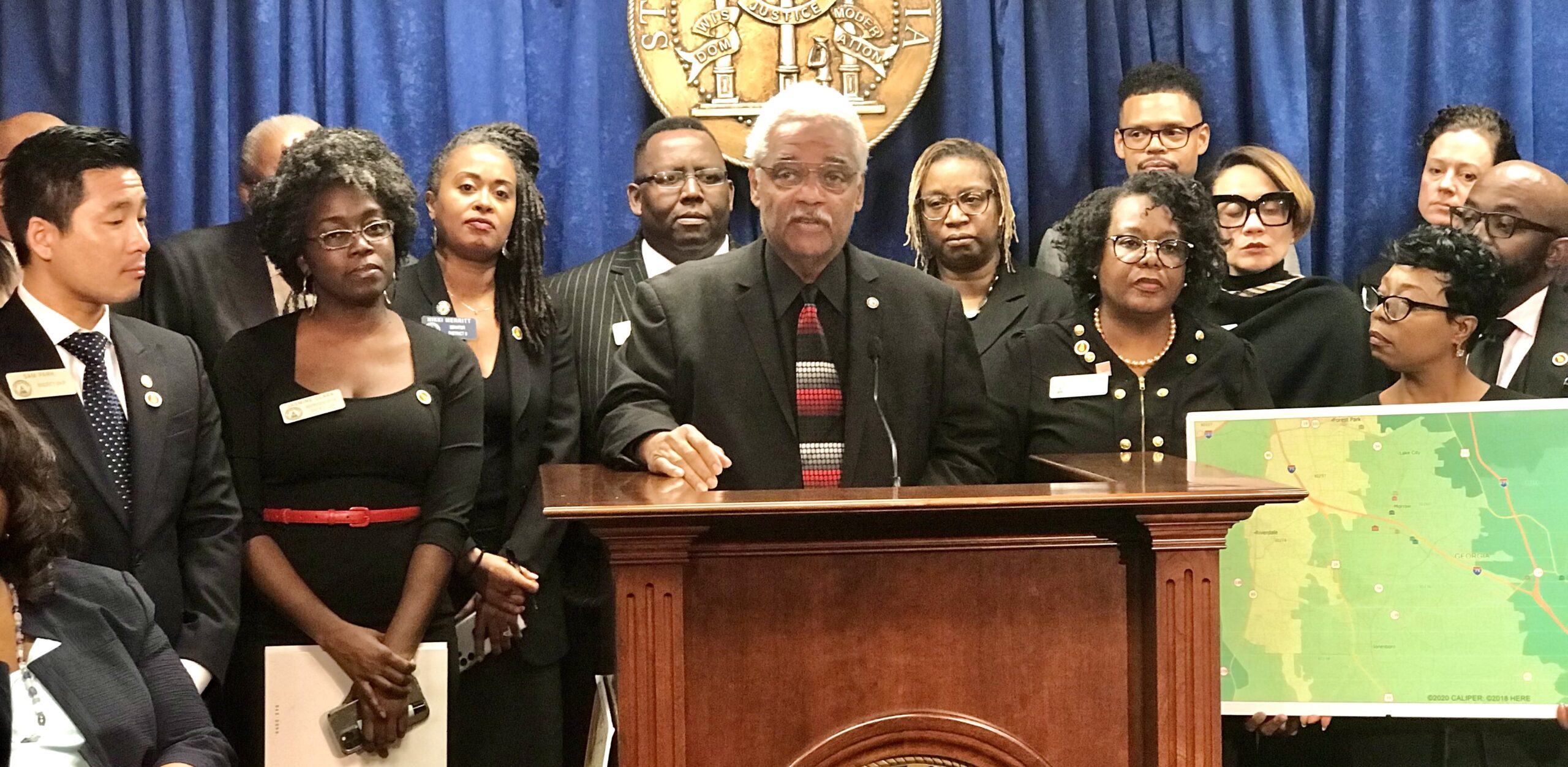Stay ahead of the curve as a political insider with deep policy analysis, daily briefings and policy-shaping tools.
Request a DemoLegislative Black Caucus seeks to lock in Kemp’s recent efforts to increase diversity in state contracts

Rep. Roger Bruce, D-Atlanta, speaks at a press conference in Atlanta on Feb. 17, 2023, by the Georgia Legislative Black Caucus (GLBC) at which they announced their 2023 priorities. (Credit: Jill Jordan Sieder)
The Gist
The Georgia Legislative Black Caucus (GLBC) announced its 2023 priorities this week, and equity issues predominate its agenda, including access to credit, affordable housing, medicine and support for Black farmers and Black-owned businesses.
One bill, introduced this week by veteran lawmaker Rep. Roger Bruce, D-Atlanta, focuses on promoting more racial, ethnic and gender diversity in the awarding of state contracts. Bruce led the GLBC in pushing for similar legislation in prior years, without success. The difference this year, he hopes, is that Gov. Brian Kemp is already supporting some of the bill’s key provisions.
What’s Happening
The Georgia Equitable Contracting Opportunity Act (HB 289) calls for the creation of a new Division of Supplier Diversity within the Department of Administrative Services (DOAS), which handles procurement and contracting for goods and services across the state. It creates a director position to lead the division as well as a “minority and women-owned business enterprises state-wide advocate” to help oversee the development and enforcement of new, more equitable policies and procedures for procurement contracts.
“We want to make sure we’re not in a situation where all the contracts in state government are going to the same people,” said Bruce. “Right now we have a big disparity between the number of African-Americans in Georgia and the share of contracts that they’re getting.”
Why It Matters
Blacks make up 32% of Georgia’s population and own about 5% of private businesses in the state, according to the Georgia Minority Supplier Development Council (GMSDC), which certifies minority enterprises to do business with private and public sectors. Those Black-owned businesses earn 2.1% of annual revenues earned by all businesses in the state, while all minority-owned firms earn 12.2% of business revenues, says GMSDC.
When it comes to the $4.5 billion in state contracts annually awarded by DOAS and other state agencies, the share of Black and other minority-owned businesses is not clear, because DOAS and other agencies have not been uniformly tracking it. DOAS has, as mandated by federal law, tracked $1.6 billion in federally-funded state transportation contracts awarded to Georgia contractors, and reported that minority-owned businesses were awarded $89 million, or 5.5% of those contracts in 2022.
HB 289 calls for the state to conduct a study “to determine whether there is a disparity between the number of qualified minority and women-owned enterprises ready, willing and able to perform state contracts for commodities, services and construction and the number of such contractors actually engaged to perform such contracts to determine what changes, if any, should be made to state policies.”
“We want to make sure that we are spreading those contracts out,” said Bruce. “And if we find out, as I know we will, that contracts are not being awarded on an equitable basis, then the idea is to come up with policies and practices to make sure that it’s balanced and equalized.”
At the press conference introducing the GLBC agenda this week, caucus chair Carl Gilliard, D-Savannah, said, “If we’re the number one place to do business in the nation, then we should do business with all of our people.”
Bruce said his bill is intended to codify and ultimately fund the supplier diversity initiative that Kemp put in motion through an executive order last July.
Kemp’s order created a management position for small business and supplier diversity within the state purchasing division of DOAS. Julian Bailey, a state procurement supervisor with a decade of experience in working with minority businesses, was selected to take on the new role.
Bailey led a Kemp-mandated effort by DOAS last summer and fall to reach out to small minority-owned, woman-owned and veteran-owned businesses across the state to find out what their experiences are with bidding for state contracts, and what could make the process easier. Their 85-page report issued in October found that many small business owners face obstacles in satisfying state bid requirements, including understanding the bidding process, finding out about bids and potential business partners, and in securing access to sufficient capital and credit needed to win contracts.
The report made recommendations that included expanding the minority business enterprise certification program; piloting an informal, less complicated bidding process for contracts under $100,000; and appointing small business liaisons at every state agency, college and university that deals with state contracts to help business owners navigate the bidding and contracting process.
It also recommended lessening the level of prior contracting experience, capitalization and insurance required for some state contracts, which has knocked many small businesses out of contention.
“A big part of what our businesses need is better access to information about how it all works,” said Bruce. “I imagine we spend millions of dollars just on toilet paper at the state level, for all the state offices, state buildings and military bases. For something as simple as toilet paper, how do you bid on a contract to provide it?”
What’s Next
“I thank the governor for supporting this effort through executive order before we dropped the bill again this year,” said Bruce. “We agree with him that all this needs to be done, and we want to make sure that it happens. The next governor could come in and just ignore it.”
HB 289 has been read on the House floor twice and awaits action by the Governmental Affairs Committee, which didn’t move on a similar bill last year.
“I don’t know that we need to create a new level of bureaucracy and expense around an issue that policy could address,” said Rep. Alan Powell, R-Hartwell, a veteran lawmaker who sits on the committee.
Powell said he agrees with many of the recommendations by DOAS to simplify the bidding process and to make state contracts more accessible to small businesses, “whether that’s minority-owned, woman-owned, or anyone qualified to do the job.
“I understand what Governor Kemp has done, and I don’t have an issue with it,” Powell said. “But I can assure you from experience that when you create a whole new division within an agency, all that does is create jobs and more expense. We need to be conservative with taxpayer money and tackle some of these issues through policy changes, and then make sure the legislature maintains good oversight on those policies.”
Update, July 17, 2023: HB 128, sponsored by Rep. Soo Hong, R-Lawrenceville, and aimed at making the process easier for minority-, women-, and veteran-owned businesses to qualify for state contracts, was signed by Gov. Kemp on April 24. It will become effective January 1, 2024.
Contact Jill Jordan Sieder on Twitter @JOURNALISTAJILL or at [email protected].
Twitter @StateAffairsGA
Instagram @stateaffairsGA
Facebook @stateaffairsUS
LinkedIn @stateaffairs
Header image: Rep. Roger Bruce, D-Atlanta, speaks at a press conference in Atlanta on Feb. 17, 2023, by the Georgia Legislative Black Caucus (GLBC) at which they announced their 2023 priorities. (Credit: Jill Jordan Sieder)
Newly minted Senate Minority Leader Harold Jones II: ‘I’m not the typical back-slapping politician’
Nearly 10 years into legislative life, Sen. Harold Jones II wouldn’t change anything about the experience. “I love every minute of it. Even when I hate it, I love it,” the 55-year-old Augusta Democrat told State Affairs. Come January, Jones will add another role to his legislative duties: Senate minority leader, a job held for …
Gov. Kemp calls on state agencies to be fiscally restrained amid record $16.5B surplus
The Gist Gov. Brian Kemp asked the state’s 51 government agencies for continued fiscal restraint when drafting their amended fiscal year 2025 and 2026 budgets. Most agencies adhered to his request even as the state’s general fund surplus hit a record $16.5 billion last month. Forty-five agencies, excluding state courts, followed the governor’s instructions to …
Georgia defies bomb threats as election chief declares a “free, fair and fast” vote amid record turnout
ATLANTA – Despite dealing with over 60 bomb threats, Georgia’s election chief said Tuesday the state’s general election went smoothly. Georgia had a record turnout with nearly 5.3 million people voting, Secretary of State Brad Raffensperger told reporters. Election officials in the state’s 159 counties have until 5 p.m. to certify votes. “We had a …
In the (state)house: Meet the newest members of the Georgia legislature
When lawmakers reconvene at the state Capitol on Jan. 13, there’ll be a cadre of new faces in the 236-member Georgia General Assembly, one of the nation’s largest state legislatures. All 236 statehouse seats were up for election this year. Most candidates ran unopposed. Incumbents in contested races easily kept their seats, with the exception …




